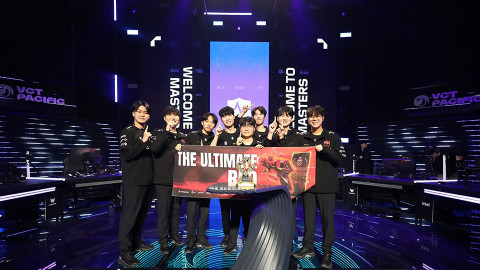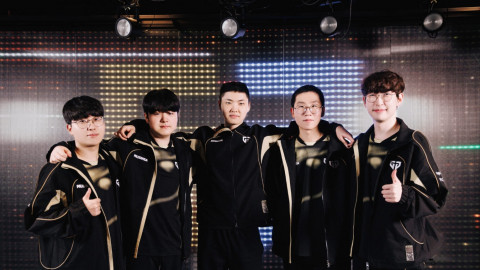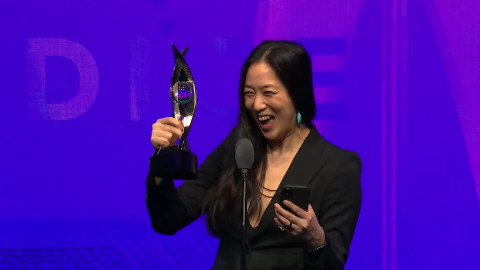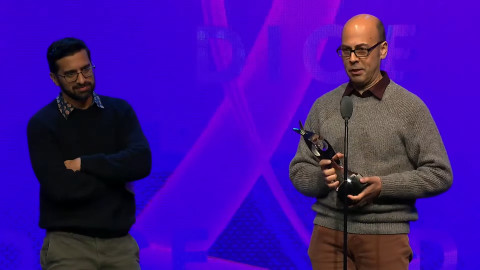
Finnish developer Housemarque has earned its reputation as the king of twin-stick shooters over the years, delivering everything from fast-paced side-scrolling action game like Resogun to the “shoot them and loot them” role-playing of Dead Nation. In June its top-down arcade shooter Nex Machina released to glowing reviews, and it more than earned its praise with excellent level design, clever boss design, and controls that felt close to perfect. Just two months later, the studio’s next game, Matterfall, has hit the PlayStation 4, and while it certainly contains many classic Housemarque staples that make it worth playing, it doesn’t quite know how to pull it all together.
Matterfall’s story, if you can even call it that, gives you the absolute bare minimum motivation you need to venture out and start blasting baddies. After humanity discovers an unusual new form of matter with properties that allow it to materialize and disappear in an instant, it’s put to use powering an extraterrestrial city called Fortuna. But without running the matter through rigorous testing before implementing it, humanity accidentally allows it to interact with local robots, causing a rampage that threatens all life. “Freelancer” Avalon Darrow is there to save them by destroying every robot she sees and rescuing the humans still trapped on Fortuna’s surface.

All of this is told in the opening title screen, before you even reach the main menu. There’s something to be said for keeping the narrative pared down in an arcade-style game like Matterfall, but it’s hard not to compare it to Nex Machina, which featured a similar aesthetic for its levels, rampaging robots, and humans to save. Housemarque has certainly found its niche, but I worry that continuing to focus on these same basic story pillars will eventually yield diminishing returns.
Once Avalon is dropped into the game’s first futuristic environment, she shoots first and asks questions later. Matterfall’s control scheme is a little more complicated than Nex Machina or even Dead Nation, and partially because it’s a side-scroller this time around, the fights require a little bit of strategy in addition to the reflex-heavy shooting we’ve seen from Housemarque in the past. In addition to a basic, unlimited-ammunition machine gun on her arm, Avalon has access to special weapons such as grenade launchers and railguns that allow her to cut large enemies down to size quickly. These are found by rescuing the humans in secret areas scattered throughout each level, as are other passive “augmentations” that can increase the effectiveness of your weapons or offer a boon to one of your other abilities.
While they aren’t all that necessary for the majority of Matterfall, by the time you reach the end, you’ll be at a definite disadvantage without access to at least a few augmentations. In this regard, Housemarque doesn’t seem to know its audience for the game. It gives players a time bonus at the end of each level, but this is only relevant if you’re speeding through without stopping to examine every nook and cranny. Make it to the end of the game without getting a few key abilities, and it will be almost impossible to complete – it might have been better for Matterfall to artificially limit progress until you’ve rescued at least a few humans, as you’ll inevitably have to return to old levels if you missed them, anyway.

Matterfall’s unique hook is the game’s titular “matter,” which can be placed throughout each level as a platform or a shield to block enemy fire. Avalon can pass through the material using a dash ability that also stuns enemies, and using this, as well as a brief supercharge ability, effectively is crucial to making it out of the game’s toughest areas. Unfortunately, the game’s control scheme led to a few too many cheap deaths during my playthrough. Movement is controlled using the left analog stick, which is preferable in most arcade shooters, but Avalon’s dash can only be used in four directions. If your stick is tilted just a bit too far in one direction, she’ll dash to the right when you meant for her to dash up. Against normal groups of enemies, it’s annoying, but it’s absolutely infuriating when facing bosses that fire dozens of shots at once.
None of this is to say that the combat isn’t enjoyable. When Matterfall is firing on all cylinders, which is frequently is, it feels just as engaging as any shooter Housemarque has ever made. Different enemy types regularly attack you at the same time, and figuring out which ones to prioritize as you dash around the battlefield and dodge enemy fire is still a blast. The game also does a great job of introducing new, powerful enemy types with a short, three-second cinematic, showing off their equipment before you have to fight them for the first time. After that, you’re on your own when you run into them again, but this brief introduction is enough to prepare you.

Matterfall is at its best – and its most infuriating – during boss fights. There are only three of them in the whole game and a skilled player can likely get to the end in just a few hours, but they force you to make use of nearly every trick you’ve learned along the way. Deadly abilities including impenetrable laser beams and walls made of indestructible red matter are nearly impossible to avoid, but if you’ve been taking each level’s emergent gameplay lessons to heart, you’ll have the tools necessary to win … at least for the first two bosses. As with Nex Machina and 2016’s Alienation, the final boss of Matterfall is comically difficult, even on the easiest difficulty setting. I was up until after midnight trying to beat it only to have my dreams crushed repeatedly, and though I eventually did get lucky enough to deal the final blow, I felt more relief than I did any sense of accomplishment. Once you’ve beaten the game on any difficulty, you unlock a final “master” difficulty mode, which seems like a perfect fit for masochists with too much time on their hands. But for everyone else, being stuck at the end of a game for several hours is never fun.
Housemarque has shown that its famous twin-stick shooting expertise can be applied to more than just twitchy arcade games, and Matterfall succeeds more often than it fails. But by using a one-size-fits-all approach to some of the game’s most important elements, it feels stuck between being an open-ended action-platformer and a more traditional shooter like Resogun. It’s still definitely worth checking out, but if you have to pick between Matterfall and one of Housemarque’s older titles, the choice is pretty clear.

Sort by:
Comments :0






